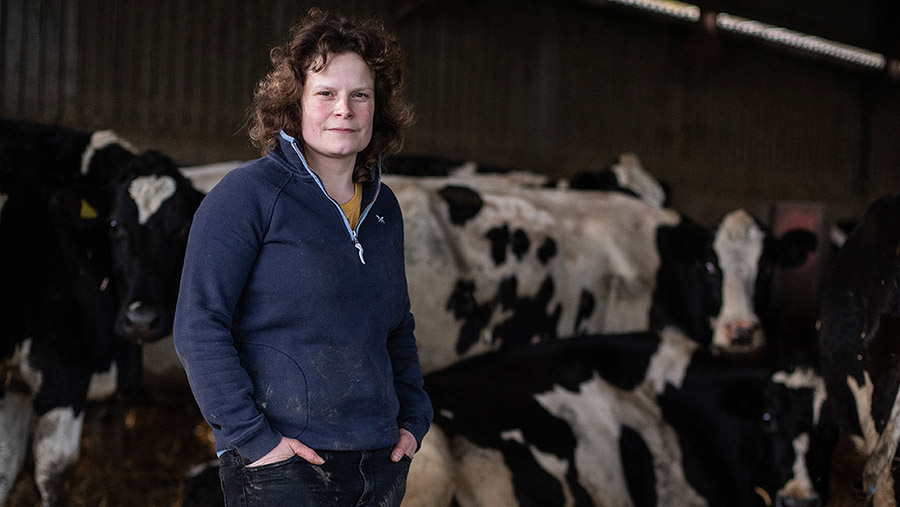Farming careers: Working as a dairy herdsperson
 Hannah Edwards © Hannah Edwards
Hannah Edwards © Hannah Edwards Hannah Edwards, 32, works on 40ha Hill Farm, on the Shropshire-Powys border, which is home to the Crew Hill pedigree Holstein herd.
The herd includes 180 milking cows and 170 followers, with an average annual yield of 8,000 litres at 4.25% butterfat and 3.25% protein.
Hannah works alongside boss Philip Davies and a four-times-a-week relief milker, milking twice a day.
See also: Farming careers: Working as a pig stockperson
Hannah grew up on a dairy farm, but wanted to become a vet. During her gap year after A-levels in 2009, she took on a few relief milking jobs, one of which was supposed to be for just three months at Hill Farm.
She has worked there ever since, learning on the job, and has been herdsperson since 2017.
Hannah works about 70 hours a week across seven days. This includes: milking 10 times a week; feeding cows; bedding and scraping up; rearing, tagging and dehorning calves; calving; dry cow and feet management; routine vet visits; heat detection; and maintaining records.
“It is an incredibly fulfilling and satisfying job,” says Hannah. “Every day brings its own challenges, but the best part has to be saving life and welcoming new life.
“You get to know each and every cow inside out and they really do become a big part of your life. I thoroughly enjoy the breeding side of things, it’s nice to trace back cow families and see how we can improve.”
In 2017, Philip Davies gifted Hannah a calf out of her favourite cow to help her start her own herd. She bought a heifer off him every few months and now has 20 milking cows and heifers, and 15 youngstock, the keep for which is deducted from her pay.
Hannah hopes to do her artificial insemination course this year and to be farming in her own right in the future.
“I am incredibly lucky to have such an encouraging and supportive boss, which I am very grateful for,” she says.
“Sometimes all you need is a little encouragement and a lot of determination, and anything is possible.”
Job profile
What does the job involve?
Being responsible for milking, the everyday routine, the general welfare of the herd, and record-keeping. Generally, people are doing 12 days on, two days off, or 11 days on, three days off.
What qualifications/experience are needed?
At entry level, no higher education, qualifications or experience are necessary. It’s high-repetition work that people can very quickly learn on the job. People can do additional specific training such as administering medicine, transporting animals or hoof trimming and refine those skills over time.
Apprenticeships are available. This can be an attractive way for a larger business to introduce a new employee, by having them shadow a more senior herdsperson and then build up a bit of relief in the system.
What would be a typical salary?
Mid £30,000/year, depending on experience. Generally it’s a salaried position because of the number of hours people are working.
How do you progress from this role?
If an individual is organised, there is always scope for them to become the herd manager, which is the natural progression, depending on the unit.
Ways to achieve this include seizing training opportunities, networking at dairy events, and ensuring they keep up to date with the industry.
Regular appraisals can help agree targets for an employee to grow, as well as ensuring the employer understands their staff’s ambitions.
In certain instances you do also see a herdsperson having the opportunity to start their own herd.
How can employers best recruit, manage and maintain staff for this role?
- Social media can be a good way to recruit, especially if the business presents itself well online
- Accommodation – or at least access to a property – is basically a given and it isn’t easy to recruit someone without this
- An employer demonstrating a development pathway is useful
- Automation – anything that reduces the physical labour effort such as automatic foot-baths, scrapers and silage sweeps – makes a big difference and makes a role more attractive
Source: Edward Hutley, partner, Ceres Rural
